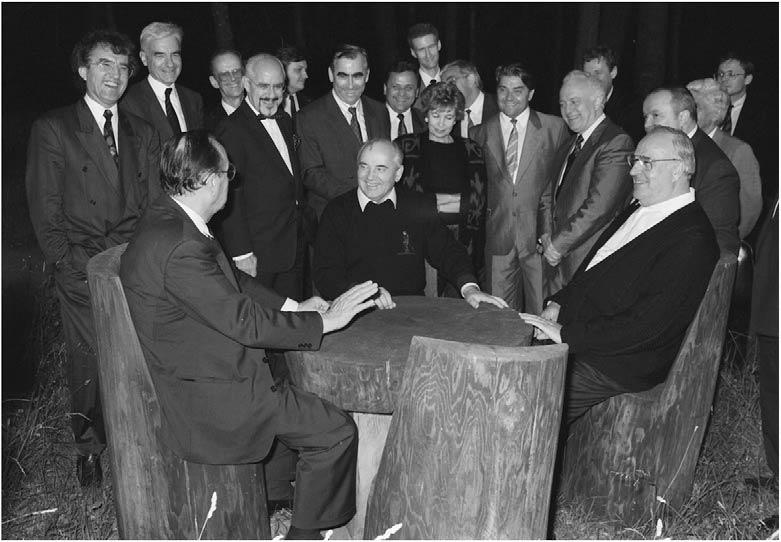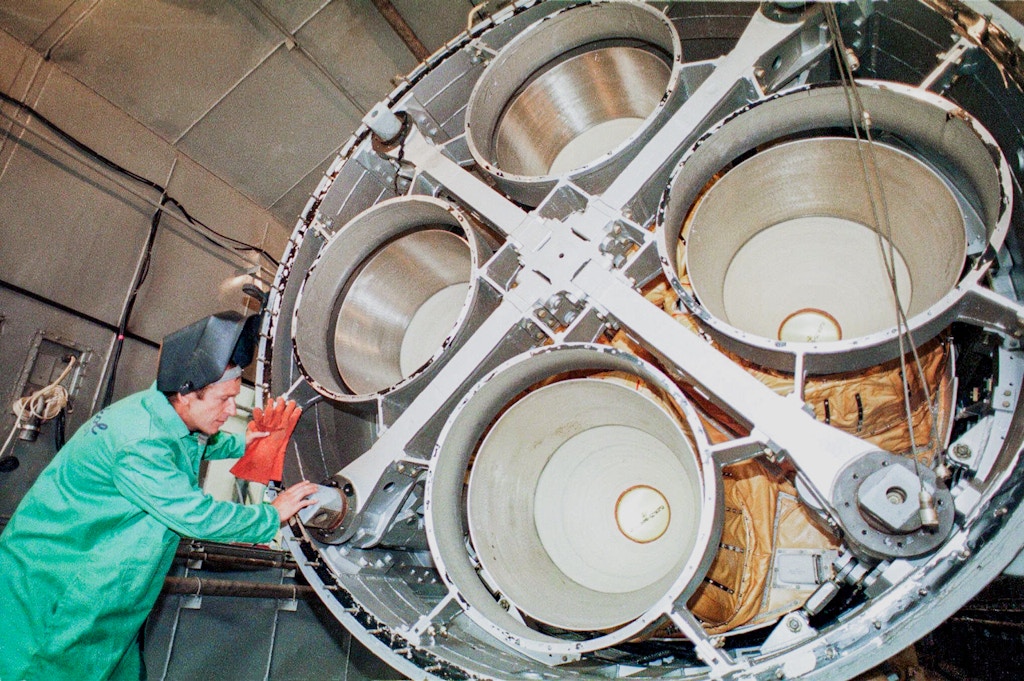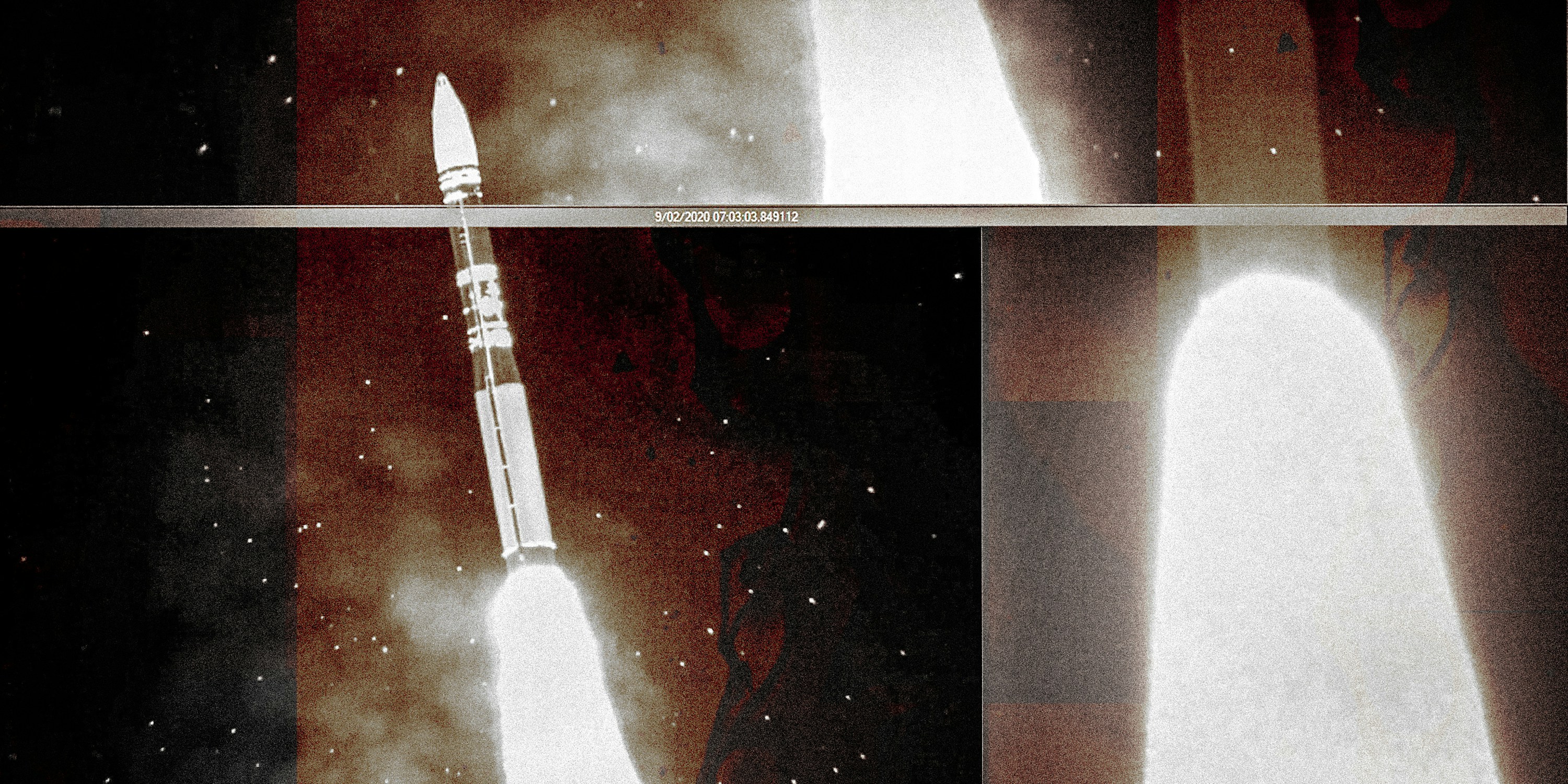I. AGREEMENTS, DECLARATIONS, PROMISES
1. NATO Expansion: What Gorbachev Heard (National Security Archives)
Declassified documents show security assurances against NATO expansion to Soviet leaders from Baker, Bush, Genscher, Kohl, Gates, Mitterrand, Thatcher, Hurd, Major, and Woerner
Slavic Studies Panel Addresses “Who Promised What to Whom on NATO Expansion?”

Washington D.C., December 12, 2017 – U.S. Secretary of State James Baker’s famous “not one inch eastward” assurance about NATO expansion in his meeting with Soviet leader Mikhail Gorbachev on February 9, 1990, was part of a cascade of assurances about Soviet security given by Western leaders to Gorbachev and other Soviet officials throughout the process of German unification in 1990 and on into 1991, according to declassified U.S., Soviet, German, British and French documents posted today by the National Security Archive at George Washington University (http://nsarchive.gwu.edu).
The documents show that multiple national leaders were considering and rejecting Central and Eastern European membership in NATO as of early 1990 and through 1991, that discussions of NATO in the context of German unification negotiations in 1990 were not at all narrowly limited to the status of East German territory, and that subsequent Soviet and Russian complaints about being misled about NATO expansion were founded in written contemporaneous memcons and telcons at the highest levels.
The documents reinforce former CIA Director Robert Gates’s criticism of “pressing ahead with expansion of NATO eastward [in the 1990s], when Gorbachev and others were led to believe that wouldn’t happen.”[1] The key phrase, buttressed by the documents, is “led to believe.”
President George H.W. Bush had assured Gorbachev during the Malta summit in December 1989 that the U.S. would not take advantage (“I have not jumped up and down on the Berlin Wall”) of the revolutions in Eastern Europe to harm Soviet interests; but neither Bush nor Gorbachev at that point (or for that matter, West German Chancellor Helmut Kohl) expected so soon the collapse of East Germany or the speed of German unification.[2]
[..] When Russian Supreme Soviet deputies came to Brussels to see NATO and meet with NATO secretary-general Manfred Woerner in July 1991, Woerner told the Russians that “We should not allow […] the isolation of the USSR from the European community.” According to the Russian memorandum of conversation, “Woerner stressed that the NATO Council and he are against the expansion of NATO (13 of 16 NATO members support this point of view).” (See Document 30)
Thus, Gorbachev went to the end of the Soviet Union assured that the West was not threatening his security and was not expanding NATO.
The full report can be accessed here:
2. The Budapest Memorandum on Security Assurances
The Budapest Memorandum on Security Assurances refers to three identical political agreements signed at the OSCE conference in Budapest, Hungary on 5 December 1994 to provide security assurances by its signatories relating to the accession of Belarus, Kazakhstan and Ukraine to the Treaty on the Non-Proliferation of Nuclear Weapons (NPT). The memorandum was originally signed by three nuclear powers: the Russian Federation, the United Kingdom and the United States. China and France gave somewhat weaker individual assurances in separate documents.[1]
The memorandum included security assurances against threats or use of force against the territorial integrity or political independence of Ukraine, Belarus, and Kazakhstan. As a result of other agreements and the memorandum, between 1993 and 1996, Belarus, Kazakhstan and Ukraine gave up their nuclear weapons.[2]
Analysis
[…] The Budapest Memorandum was negotiated at political level, but it is not entirely clear whether the instrument is devoid entirely of legal provisions. It refers to assurances, but it does not impose a legal obligation of military assistance on its parties.[1][26] According to Stephen MacFarlane, a professor of international relations, “It gives signatories justification if they take action, but it does not force anyone to act in Ukraine.”[25] In the US, neither the George H. W. Bush administration nor the Clinton administration was prepared to give a military commitment to Ukraine, and they did not believe the US Senate would ratify an international treaty and so the memorandum was adopted in more limited terms.[26] The memorandum has a requirement of consultation among the parties “in the event a situation arises that raises a question concerning the… commitments” set out in the memorandum.[27] Whether or not the memorandum sets out legal obligations, the difficulties that Ukraine has encountered since early 2014 may cast doubt on the credibility of future security guarantees that are offered in exchange for nonproliferation commitments.[28] Regardless, the United States publicly maintains that “the Memorandum is not legally binding“, calling it a “political commitment”.[29]
Ukrainian international law scholars such as Olexander Zadorozhny maintain that the Memorandum is an international treaty because it satisfies the criteria for one, as fixed by the 1969 Vienna Convention on the Law of Treaties (VCLT) and is “an international agreement concluded between States in written form and governed by international law”.[30]
https://en.wikipedia.org/wiki/Budapest_Memorandum_on_Security_Assurances
The full text of the memorandum:
https://www.pircenter.org/media/content/files/12/13943175580.pdf
3. What the Budapest Memorandum means for the U.S. on Ukraine
[…] After the dissolution of the Soviet Union, Ukraine was suddenly left with the world’s third-largest nuclear arsenal. So it, the United States and Russia reached an agreement in 1994, known as the Budapest Memorandum on Security Assurances, by which Ukraine would turn over its nukes in exchange for those security assurances.
[…] unlike Article 5 of the NATO charter, it does not require a specific response from the United States or others. So it’s worth a little history lesson.
[…] The agreement is not an official treaty. It is neither legally binding nor does it carry an enforcement mechanism. And while it provides security assurances, they do not include specific promises with regard to a potential invasion.
[…] “Naturally, if there were any provisions in this agreement that obligated the United States to take on new security responsibilities of its own, of course it would be submitted to the Senate,” Talbott testified. “But there are no such obligations contained in the accord.”
https://www.washingtonpost.com/politics/2022/02/01/what-budapest-memorandum-means-us-ukraine/
4. The Breach: Ukraine’s Territorial Integrity and the Budapest Memorandum
The Budapest Memorandum failed to deter Russian
aggression because it imposed no immediate cost
for its violation. The political assurances it provided
rested on the goodwill and self-restraint of the
guarantors, an arrangement that can work between
allies but not potential adversaries.
[…] Second, the US and
Russia pledged security assurances, which were
less substantial than the guarantees Ukraine
wanted, but more than Russia had previously been
willing to provide.
To access the full text, copy the link address and paste it in the browser.
Click to access Issue%20Brief%20No%203–The%20Breach–Final4.pdf
5. Bucharest Summit Declaration
Issued by the Heads of State and Government participating in the meeting of the North Atlantic Council in Bucharest on 3 April 2008
Point 2. Today, we have decided to invite Albania and Croatia to begin accession talks to join our Alliance. We congratulate these countries on this historic achievement, earned through years of hard work and a demonstrated commitment to our common security and NATO’s shared values. The accession of these new members will strengthen security for all in the Euro-Atlantic area, and bring us closer to our goal of a Europe that is whole, free, and at peace.
Point 23. MAP (Membership Action Plan) is the next step for Ukraine and Georgia on their direct way to membership. Today we make clear that we support these countries’ applications for MAP. Therefore we will now begin a period of intensive engagement with both at a high political level to address the questions still outstanding pertaining to their MAP applications. We have asked Foreign Ministers to make a first assessment of progress at their December 2008 meeting. Foreign Ministers have the authority to decide on the MAP applications of Ukraine and Georgia.
The full text:
https://www.nato.int/cps/en/natolive/official_texts_8443.htm
II. UKRAIN CRISIS – COMMENTARIES
The opinions expressed by the authors and speakers do not represent the views of Polonia Institute
1. Lesson From Ukraine: Breaking Promises to Small Countries Means They’ll Never Give Up Nukes
In the 1990s, world powers promised Ukraine that if it disarmed, they would not violate its security. That promise was broken.

UKRAINE WAS ONCE home to thousands of nuclear weapons. The weapons were stationed there by the Soviet Union and inherited by Ukraine when, at the end of the Cold War, it became independent. It was the third-largest nuclear arsenal on Earth. During an optimistic moment in the early 1990s, Ukraine’s leadership made what today seems like a fateful decision: to disarm the country and abandon those terrifying weapons, in exchange for signed guarantees from the international community ensuring its future security.
[…] Ukrainians are not the only ones who have come to regret signing away their nuclear weapons. In 2003, Libyan dictator Muammar Gaddafi made a surprise announcement that his nation would abandon its nuclear program and chemical weapons in exchange for normalization with the West.
[…] To date, no nuclear-armed state has ever faced a full-scale invasion by a foreign power, regardless of its own actions. North Korea has managed to keep its hermetic political system intact for decades despite tensions with the international community. North Korean officials have even cited the example of Libya in discussing their own weapons.
2. Russia’s Ukraine War Heightens Urgency Around Biden’s Nuclear Weapons Strategy
With the Russian invasion of Ukraine, prospects for U.S. nuclear disarmament look bleak.

[…] There will now likely be heightened pressure on Biden, who is yet to approve his final nuclear weapons strategy, to continue Trump’s expansionist course. Stephen Young of the Union of Concerned Scientists warned that hawks in the administration will try to convince Biden to keep the cruise missile and gravity bomb that his predecessor endorsed. “People will see it, they will claim it’s a sign of weakness if the U.S. cancels anything right now,” he told The Intercept. Hester said Biden may also be less willing to adopt a “no first use” policy, especially if fearful European allies, who’ve already lobbied against it, urge Biden again not to make major reforms. And, in what Hester described as a worst-case scenario, the president could decide to increase spending on cyber operations and other non-nuclear capabilities, then frame the relative change as a reduction in nuclear weapon reliance without cutting the arsenal at all.
Biden will weigh his options as he considers the draft Nuclear Posture Review that, prior to the crisis in Ukraine, was expected early this year. The NPR is a public document that each president since Bill Clinton has released to declare their policy on nuclear weapons. According to Hester, the draft is currently sitting on the president’s desk awaiting approval and any changes that he may deem necessary. Young said Defense Department officials have told him that the strategy’s rollout will be delayed until after the crisis in Ukraine settles. The White House and Pentagon did not reply to requests for comment.
3. John Mearsheimer – The Causes and Consequences of the Ukraine Crisis (Video)
John J. Mearsheimer, the R. Wendell Harrison Distinguished Service Professor in Political Science and Co-director of the Program on International Security Policy at the University of Chicago, assesses the causes of the present Ukraine crisis, the best way to end it, and its consequences for all of the main actors. A key assumption is that in order to come up with the optimum plan for ending the crisis, it is essential to know what caused the crisis. Regarding the all-important question of causes, the key issue is whether Russia or the West bears primary responsibility.
A presentation at the University of Chicago
An interview:
4. Ukraine’s Deadly Gamble

Russian President Vladimir Putin chose this war, Joe Biden said in his Thursday afternoon speech to America regarding the conflict in Ukraine. That is true, but U.S. elites also had something to do with Putin’s ugly and destructive choice—a role that Democrats and Republicans are eager to paper over with noble-sounding rhetoric about the bravery of Ukraine’s badly outgunned military. Yes, the Ukrainian soldiers standing up to Putin are very brave, but it was Americans that put them in harm’s way by using their country as a weapon, first against Russia and then against each other, with little consideration for the Ukrainian people who are now paying the price for America’s folly.
It is not an expression of support for Putin’s grotesque actions to try to understand why it seemed worthwhile for him to risk hundreds of billions of dollars, the lives of thousands of servicemen, and the possible stability of his own regime in order to invade his neighbor. After all, Putin’s reputation until this moment has always been as a shrewd ex-KGB man who eschewed high-risk gambles in favor of sure things backed by the United States, like entering Syria and then escalating forces there. So why has he adopted exactly the opposite strategy here, and chosen the road of open high-risk confrontation with the American superpower?
https://www.tabletmag.com/sections/news/articles/ukraines-deadly-gamble
5. Is Putin Considering Using Nukes on NATO?
By Patrick Buchanan
[….] Putin needs to get this war over with, for time is not on his side or Russia’s side. In a week, he has become a universally condemned and isolated figure, and his country has been made the target of sanctions by almost the entire West. He is being depicted as an aggressor, even a war criminal, who is brutalizing a smaller neighbor, which, in its fierce and brave resistance, has taken on the aspect of a heroic nation.
The world is rallying to Ukraine.[…]
NATO is uniting. […]
The longer this war goes on, the greater the certainty that it bleeds the invading army to levels intolerable to Mother Russia, which is what eventually happened in Afghanistan in the 1980s. If this war does not end soon, Putin is likely to lose it and fail in his goal of pulling Ukraine out of the Western camp and back into the orbit of Mother Russia. Eventual defeat is becoming visible, and Putin probably cannot politically survive such a defeat.
[…]
What should U.S. policy be?
https://www.intellectualtakeout.org/is-putin-considering-using-nukes-on-nato-/
6. Putin’s War at Home
How Conflict in Ukraine Complicates His Balancing Act
Russian President Vladimir Putin’s greatest claim is to have restored his country’s stability after the turbulent early post–Cold War years. But by launching a full-scale invasion of Ukraine this week, he has put that stability at risk. Balancing Russia’s many competing interests to maintain order and control has never been easy. But doing so in the wake of a conflict that could divide the public and pinch the pockets of some Russian elites will be even harder.
[…] Some Russians will welcome Putin’s invasion of Ukraine, but a repeat of the popularity bump the Kremlin enjoyed after its bloodless annexation of Crimea appears unlikely. Public opinion surveys show that the Russian public does not share Putin’s view that Ukraine is not a “real country.” Polls conducted over the last decade consistently indicate that roughly 80 percent of Russians recognize Ukraine as an independent state, and that only about 20 percent prefer some form of unification.
[…] Given that the route to great wealth in Russia runs through good relations with the Kremlin, business elites are unlikely to abandon Putin. But the conflict in Ukraine will make it harder for the Russian leader to keep all of his cronies happy, especially since U.S. and European sanctions will hurt some of them more than others.
https://www.foreignaffairs.com/articles/russia-fsu/2022-02-26/putins-war-home
7. Turkey, between a rock and a hard place on Russia
Ankara faces increasing pressure to choose between Moscow and Kyiv.
Outside of the immediate conflict, one of the countries most affected is Turkey, which has profited from strong ties to both Moscow and Kyiv for a long time. Ankara’s delicate balancing act between its two partners is becoming much more difficult to sustain as the fighting intensifies and the West ratchets up pressure on Russian President Vladimir Putin. As a part of NATO and a regional heavyweight, Turkey is under great pressure to finally pick a side.
https://www.politico.eu/article/turkey-between-a-rock-and-a-hard-place-on-russia/